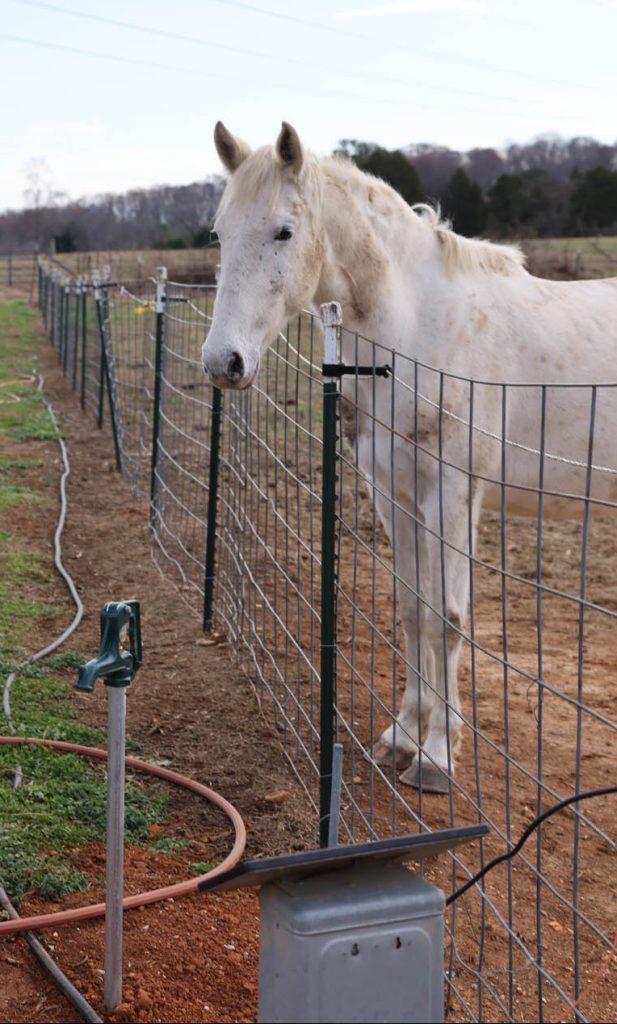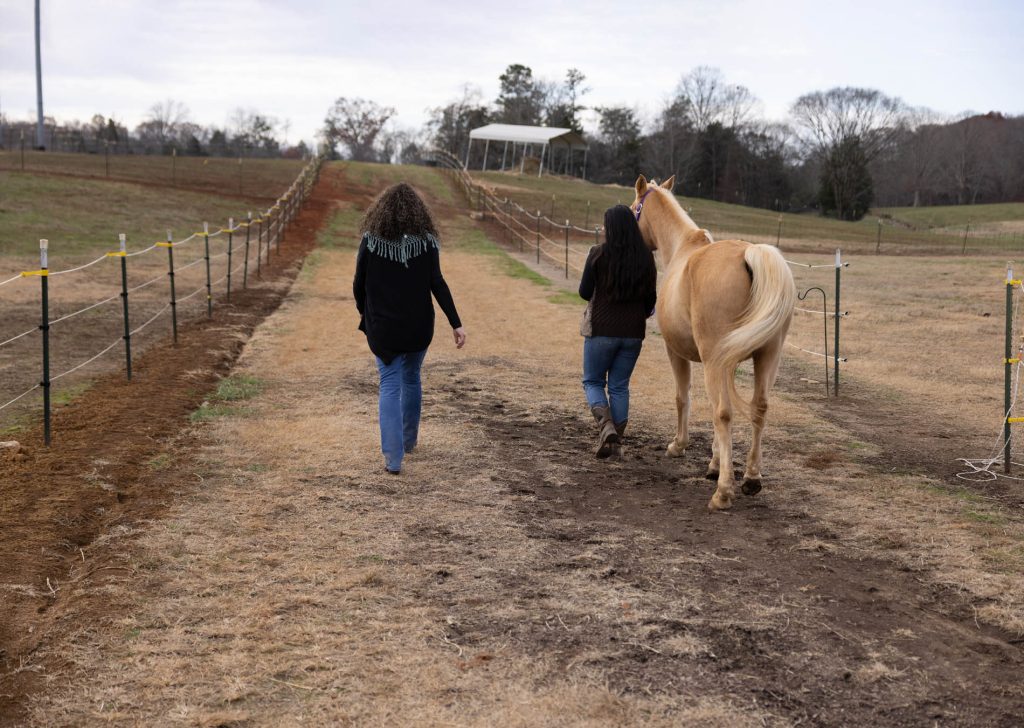Horse Haven nurtures abused and neglected horses — and the people who love them
When Ashley Ford arrives for a day of work at Horse Haven, she knows she is at a place of peace. “My favorite thing is when I walk in, everyone greets me,” she says.
By everyone, the organization’s executive director doesn’t just mean staff members and volunteers. Their charges, the horses that have been rescued from abuse or neglect, nicker their hellos, too. Sunlight filters into the barn and the smells of hay and horse combine for a pleasant earthy scent. And the sounds? “There’s nothing better than hearing a horse munch on food or hay. You know they don’t have to worry about their next meal.”
A Volunteer Effort
Horse Haven has been providing such safety and security since 1999. That’s when founder Nina Margetson realized that animal control officers didn’t have a place to take an abused horse. Horse Haven is now the oldest and largest equine rescue organization in Tennessee with certification from the Global Federation of Animal Sanctuaries and Guardian status from the EQUUS Foundation. Horse Haven staff use their experience and expertise to help other rescue groups save animals.
Located on a 15-acre leased property in Loudon County, Horse Haven houses anywhere from 10 to 50 horses at any given time. (When the rescue is at capacity, it relies on a foster network to house additional horses.) The nonprofit’s 138 volunteers fill two shifts a day 365 days a year to care for the horses — feeding and grooming them, leading them outside in the morning and back to the barn before the sun comes down, cleaning their stalls, even accompanying staff and law enforcement officers on calls to rescue animals. “They are the backbone of the organization, and they all come because they love horses,” Ford says of her volunteer team. “But somehow, they find unexpected personal healing here of their own. Whether they’re dealing with illness or anxiety or family issues, everybody comes out a better person,” Ford says.

Volunteer Donnie Malone is inclined to agree. She started volunteering four years ago not because she loved horses but because her 14-year-old daughter Cadence did, and her age required a parent to be with her at the farm. “It’s hard being the mom of a teenager,” Malone recalls of those years with a young adolescent, “but over the past four years I’ve watched her grow into a woman with empathy and compassion. Volunteering together has changed our relationship.”
Ford tells the story of another volunteer, Beth Mason, who kept coming to the farm even in the midst of her battle with cancer. “She found healing from being with the horses,” Ford says. “She got so weak she would come out and just sit. She said ‘I need this place.’” When she was no longer able to get there, Ford and her team brought her favorite horse to her driveway, and Mason came out in her wheelchair for a final goodbye with her four-legged companion. “I’ll never forget that experience,” Ford says, “how much that meant to her.”
From Harm to Healing
The animals at Horse Haven come from anywhere in the state. They come because someone—a neighbor or a passerby—alerted animal control officers to a situation of abuse or neglect. “Our most recent rescue was of six horses,” Ford says. “One was two years old. Her body score was the lowest she could have; she was just a sack of bones, she could barely stand. She had to be lifted by a tractor and held in a sling to stay upright. It’s so sad to have had to experience that level of neglect in two years.”
Some of the horses rescued have never been touched by a human hand and are feral. Some have only had what grows in their field to eat. Some owners surrender them; others fight tooth and nail to get them back. Ford suspects mental health issues often lead owners to neglect their animals. Or they get in over their heads financially. “Mom always said beware of the hobby that eats,” she says.
Once a horse is seized, it is taken to UT Veterinary Hospital for an exam. A horse will remain there until it is well enough to move on to Horse Haven. Once there, it is weighed and photographed on a weekly basis, documenting its original condition and subsequent progress to district attorneys until litigation is complete. Sometimes that can take years.
Madison Whiddon, Horse Haven’s equine manager, is in charge of the horses’ care once they arrive at the facility. “I love pretty much everything about the job,” she says. “Seeing the ones that don’t trust anyone at all and then seeing where they end up once they learn they can trust humans … it’s amazing.”
“Our horses have been through things,” Ford reiterates. “We can watch them heal and learn to trust again, and their personalities come out. They’re so … majestic. It’s almost magical. They’re over 1,000 pounds and they still respect a human being. And allow them to get on their backs and ride around. What other animal does that?”
Finding Forever Homes
Eventually, however, the horses are made available for adoption. The process to acquire a horse is rigorous. “It usually starts with an electronic application, then the equine manager or I will do a phone interview and ask a ton of questions,” Ford says. “We get a vibe from that call about what they’re looking for. Then we have a meet-and-greet with the horse that’s available, and we can tell if it’s going to be a good match. Ninety percent of the horses pick their person. They take a step in and put their head on your shoulder or chest.” That meeting is followed with a visit to the prospective owner’s property. Horse Haven requires an acre of land per horse, shelter and solid fencing.

Board member Meggan Graves, an emergency veterinarian, is glad of Horse Haven’s presence in the community. “The hardest job a vet has is having to euthanize an animal, and Horse Haven is there to keep that from happening.”
Graves has benefited from the organization in another way: she and her husband adopted a mule there to add to their own small farm. “I’m a sucker for long ears,” she says. “We got her last August and she is the perfect addition to our little herd. She gets along with the other donkeys and mules and she’s even let me put a saddle on her and ride her.” It was acquiring the mule that led to Graves joining Horse Haven’s board.
A Home of its Own
Looking ahead, Graves says the organization’s number one goal is to find Horse Haven a permanent home that gives the team the ability to keep doing what they do for horses. “We need to be able to make upgrades and improvements to the facility. Property is so expensive right now and land is limited, and it’s a huge credit to the organization that it’s in a place to be financially stable and able to look for that.”
Until that day comes, Horse Haven will continue its mission at its current location, healing both horses and people every day. “Helping out an animal is therapeutic,” Graves says. “And if you’ve never loved on the soft muzzle of a horse, you’re missing out.”
To learn more, readers can visit horsehaventn.org.
